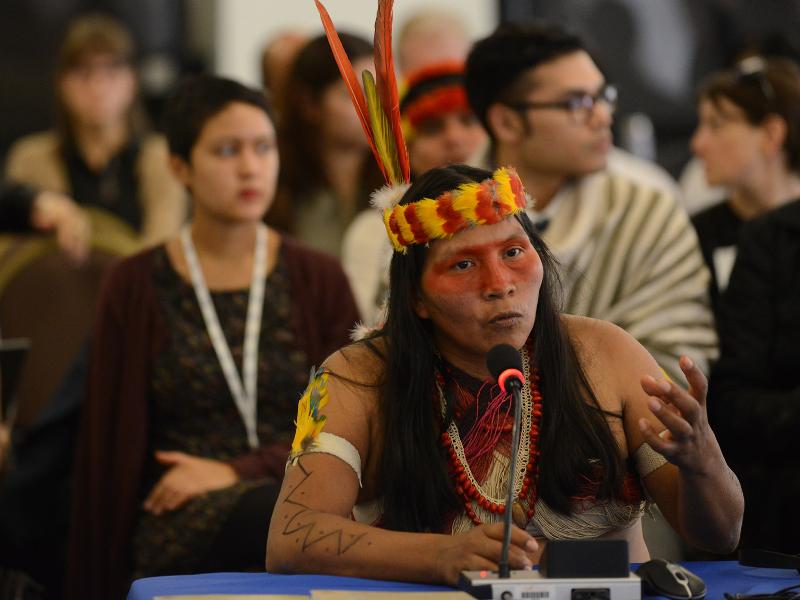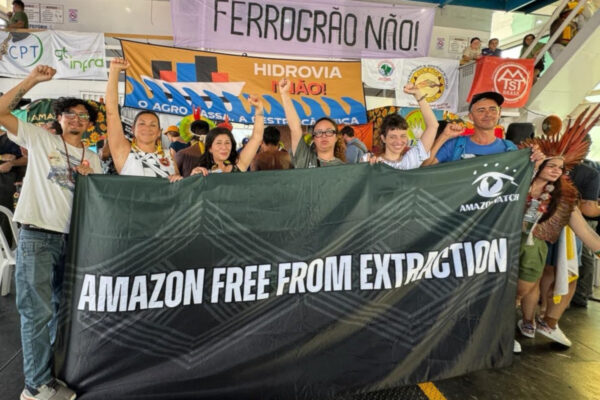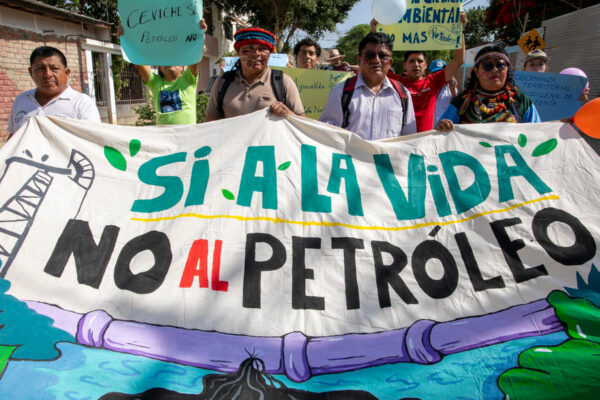
Dusk approaches after a seemingly endless day of draining meetings, and I’m standing with Alicia Cahuiya in the middle of the Washington, DC Smithsonian’s National Zoo. While not as biodiverse as Alicia’s home in the Amazon rainforest, this is the most nature we could find in the nation’s capital. We have just stepped out of the birdhouse, where Alicia joked about putting the feathers littering the ground in her ceremonial headdress and speculated about how delicious those fat birds would taste.
Any onlooker can conclude from her painted face, feathered headdress, and customary vest that Alicia is not from the metro area. Yet those outsiders will likely never have the privilege of knowing the strength of this warrior woman who refuses to stop fighting for her peoples and their land. I’m still not sure if I will ever understand her courage, but during the few days in which our lives intersected I was able to catch a glimpse of her struggle. I look at my new friend Alicia with great admiration and moments from the past two days flood my mind.
I first think of the whirlwind of advocacy meetings we have attended. Alicia, who is a leader from the Waorani indigenous people, explained her situation several times within a span of 24 hours and was clearly exhausted. She said, “I have already seen the contamination from the oil companies” and explained it is her people’s responsibility to protect her brothers and sisters from the isolated Tagaeri and Taromenani indigenous peoples. Listeners nodded their heads in agreement.
During the meetings, I watched Alicia patiently answer questions: “What are ‘isolated peoples’?”, “Why do you wear that headdress?”, and the inevitable “So what exactly would you like us to do?”.
The last question was the most difficult to answer. Listeners’ faces clearly showed concern for the indigenous woman sitting across the table. You could see the compassion in their eyes and their desire to help, but lack of resources and leverage in Ecuador often led to toothless solutions that frustrate everyone in the room, including those who knowingly provided such lackluster advice.
Next, I think of Alicia bravely walking to the front of the room to testify before the Inter-American Commission on Human Rights. Alicia first spoke at the hearing titled “Tagaeri and Taromenani Indigenous Peoples in Voluntary Isolation, Ecuador.”
She described the threats both isolated peoples and the Waorani face. The Waorani people, who have been in touch with broader Ecuadorian society for roughly forty years, have shared their vast area of the Amazon rainforest with the Tagaeri and Taromenani for time immemorial. Expanding oil activity restricts the amount of land and resources each peoples can use, creating tensions and causing conflict among the communities.
Additionally, the Waorani have already seen how oil exploration damages their land, water, and culture. The construction of roads opens up the land for development and the machinery used to extract oil is extremely loud. Such activity will not only directly impact the migration patterns of the isolated peoples, but it will also scare off hunting game and make it even harder for all people living in the territory to subsist off the land.
Alicia says, “The state is not protecting isolated peoples. If they are going to protect them, they can no longer construct more roads or oil wells…The state must, as they say, ensure and protect the Taromenani. As Waorani we ask that they keep their territory. No more exploitation there. No more taking down our trees.”
For the first time in three years, Ecuadorian government lawyers appeared at the Inter-American Commission on Human Rights for a hearing. State representatives questioned Alicia and attempted to debunk her credibility as an opponent of government programs in the Amazon with images of her attending state-led programs. But Alicia stayed strong and used this opportunity to describe how weak the government aid has been for her people.
Later that evening, Alicia participated in a second hearing titled the “Situation of defenders of human rights of indigenous peoples and the environment in Ecuador.” Along with five other inspirational women leaders, she spoke about the persecution against women environmental defenders in Ecuador.
A series of powerful statements deeply impacted the audience. Alicia looked on with fierce determination as the other women spoke. During her testimony Alicia explained, “The land is for the people who are living in the rainforest…My territory is already contaminated. How can I back down? How will my children live a healthy life? How will future generations live?”
Finally, I recall the most intense and unexpected moment of our time together. Immediately following the first hearing about uncontacted peoples, Alicia was threatened by Moi Enomenga, a fellow Waorani leader and witness for the Ecuadorian state.
Moi said, “Alicia, what you are doing is very wrong. Your sister is going to kill you. They are going to kill you when you arrive in the community.”
Unfortunately, Moi has said this to Alicia before. Although initially shaken, Alicia refused to let this death threat stop her from continuing to speak out for the indigenous peoples of the Amazon and their territory.
The Inter-American Commission on Human Rights has taken this threat seriously. It believes Alicia faces a serious and imminent threat. Within a week of the threat the IACHR formally requested that Ecuador take precautionary measures to protect Alicia.
At times it seems hard to believe how much I can learn from a person in just a few short days. Broadly speaking, Alicia demonstrated the importance of persistence in spite of clear solutions. Monotonous meetings and lack of immediate action would be enough to deter anyone from fighting the Ecuadorian government, but Alicia is focused and will speak out as long as it takes. I even have a suspicion that her request to go the zoo – a pocket of greenery and animals in the urban jungle—was to help her reconnect to nature and reignite her passion to fight.
Secondly, compassion and concern for future generations fuel Alicia, and she unknowingly taught me the unique role women play as environmental defenders. She is connected to the land and wildlife, and without nature the livelihoods of her people and the lives of their children are at risk. Indigenous women with similar beliefs have united across Ecuador and had enough with the State’s abuse and oppression of their peoples.
Most importantly, I witnessed what women warriors like Alicia experience every day. Death threats, beatings, public vilification, wrongful imprisonment, and constant dismissal of their requests have become the norm in Ecuador. Often these women fear for their safety and the lives of their families, and such sentiments are completely warranted after the murders of hundreds of environmental defenders throughout the Amazon Basin, including the murder of Shuar leader José Isidro Tendetza Antún of the Ecuadorian Amazon just days before the UN climate summit in Lima, Peru last year.
Yet such horrible situations cannot stop these women from fighting for their rights. Alicia showed me women environmental defenders are as strong and resilient as the Kapok trees that fill the land from which they reign.













